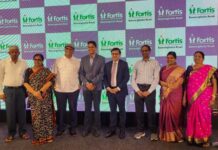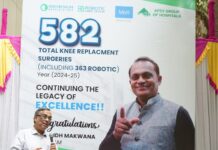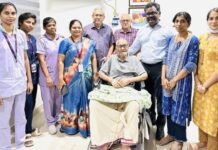The patient was completely bedridden for more than 1 year and was ventilator dependent Probably first of its kind case among children in the country
Bangalore, December 17, 2018: In yet another commitment to saving lives using the latest technologies in medical treatment, neuro specialists at Aster CMI Hospital, Bangalore performed a miracle by restoring the mobility of a 7-year-old child from Kenya by conducting a nerve pacing surgery, probably the first of its kind in the country among children. The patient was suffering from a critical spinal cord injury at the junction of skull and spine, spinal cord narrowing and high spinal cord injury requiring surgical spine stabilization. The child, Blassio Yoko Yamu, was admitted at Aster CMI Hospital for Diaphragm palsy-correction surgery – Phrenic nerve pacing. The surgery was conducted under the guidance of Dr. Ravi Gopal Varma, Chief of Neurosciences and Lead Consultant Neurosurgery, Aster CMI Hospital.
Blassio Yoko Yamu hails from deep interiors of Kenya, Africa, in a village near Mombasa. While playing on the streets one day in February 2016, he was hit by a car. Blassio was rushed to a local hospital where he underwent first aid and a CT scan and was later discharged after supervision of couple of days. Post that, Blassio remained well with occasional headaches. It was only after a year and half that a sudden deterioration in the health condition of Blassio occurred in the form of headache, weakness of all four limbs and slurring of speech. He was rushed to Gertrude’s Children’s Hospital in Nairobi – the capital city of Kenya. Further evaluation revealed a high spinal cord injury at the junction of skull and spine – compressing and paralyzing the child neck down. Hence Blassio underwent a corrective surgery at the Nairobi Hospital, but nerves supplying the respiratory muscles had already got damaged and child suffered from respiratory paralysis and became ventilator dependent. Gradually, he became completely bed-ridden and dependent on care takers for all his routine activities. The parents were completely shattered and did not want their boy to remain like this forever.
It was only in May 2018, when Gertrude’s Children’s Hospital doctors reached out to Aster CMI Hospital for a possible solution, especially with the hospital’s Deep Brain Stimulation program having taken off. After detailed evaluation of the reports, the experts at Aster CMI Hospital found that the only possibility for the child recovery was a Phrenic Nerve Stimulation – an advanced form of pacing the nerve so that the diaphragm muscle which is the primary respiratory muscle starts functioning again. Further analysis from multiple experts of various specialities at Aster CMI including pediatric neurologist, pulmonologists, ENT surgeons and Pediatric ICU team, the child was deemed fit for the procedure. Blassio was then airlifted from Kenya with a medical team on board and brought to Bangalore in August 2018.
“Blassio was kept under observation for couple of days at Aster CMI and later had a pacemaker inserted to stimulate his right Phrenic nerve. In this surgery, we placed the electrode which is used for deep brain stimulation on the right phrenic nerve and wrapped on it. After stimulating it with an external battery and checking whether it was working, the electrode was tunnelled under the skin and connected to a battery which was kept in the abdominal wall. Over next two weeks, the support from the pacemaker was escalated and ventilator supported weaned off. Being used to ventilator for a long time, Blassio resisted every attempt to make him breath more. Behavioral issues and night terrors made it difficult for him to adjust. With help of Child Psychiatry team, Counselors and a determined mother, Blassio made slow progress to be weaned off the ventilator. Also with a multidisciplinary team approach and great support from Physiotherapy, he was mobilized said Dr. Ravi Gopal Varma, Chief of Neurosciences and Lead Consultant Neurosurgery, Aster CMI Hospital”.
Post-surgery care was provided when the child was on mechanical ventilator support and there was constant monitoring and titration of diaphragm pacing. Blassio underwent physiotherapy, muscle strengthening exercises and nutritional rehabilitation. Progressively over three weeks he was weaned off the ventilator, was able to walk with support. He was shifted to ward for further care. Since the child was off ventilatory support and being mobilized well, parents wanted the child to be de-cannulated before discharge. Over another month, Blassio’s tracheostomy tube too got de-cannulated.
The seven-year-old child recovered well due to the combined effort of the departments of Neurosurgery, Neuro Anesthesia, Pediatrics and its intensive Care, ENT and Pulmonology. Then there was very commendable contribution from department of Physiotherapy and Child Psychology to get him back on his feet as soon as he was taken off ventilator.” added Dr. Ravi Gopal Varma.
After what was more than 1 year of a nightmarish life for Blassio and his family, he walked back to normalcy and flew back to his village back in Kenya. The child will need battery change for his pacemaker and arrangements have been made for that to happen locally. Though sporadic case reports of nerve pacing exists in the country, this is perhaps one of the first of its kind in children.
A child who was bedridden for almost a year, took his first steps towards a new life and went back walking, talking, eating without any support systems whatsoever.
Corporate Comm India(CCI Newswire)
























